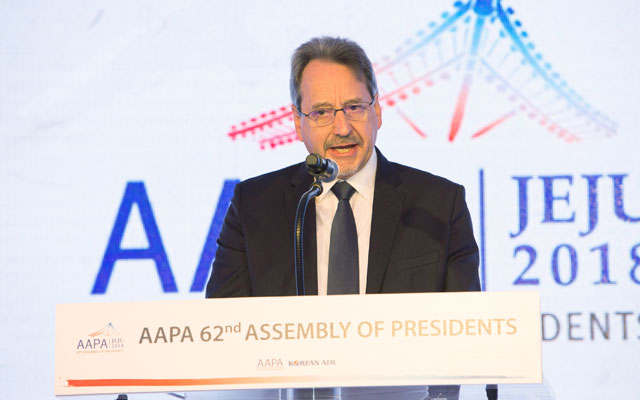The Association of Asia Pacific Airlines (AAPA) has issued five resolutions in hopes of committing governments and other stakeholders to resolve regulatory issues concerning aviation safety, environment, infrastructure, passenger rights and wildlife trafficking.
Speaking at AAPA 62nd Assembly of Presidents in Jeju last week, director general Andrew Herdman explained: “Asia-Pacific carriers lead the development of the global air transport industry, but the long-term profitability and sustainability of the industry risks being undermined by inappropriate government legislation and short-term policy thinking.”

To further enhance aviation safety, the first resolution asks governments and the industry to form regional and national safety teams within a ‘just culture’ framework outlined in ICAO’s Annex 19’s recommended practices for safety management.
The second resolution calls for the effective implementation of ICAO’s CORSIA (Carbon Offsetting and Reduction Scheme for International Aviation). Reached in 2016, the CORSIA agreement is approaching a critical stage in implementation with carriers required to report full emissions starting January next year, Herdman noted.
While the industry shows full commitment to CORSIA, the association is “concerned that some governments are imposing variations or additional requirements, which could undermine the integrity and environmental effectiveness of the scheme”.
As more airport infrastructure are necessary for the growing passenger traffic and airline fleet, AAPA said “the capital-intensive nature of infrastructure investments raises important questions about planning and financing, and the necessity for appropriate regulatory oversight by government”.
The association is “concerned about the effect on user charges, and arguing for a more coherent debate on how such infrastructure is best funded and regulated in the future”.
It also asks government to ensure that consumer protection regulations “are designed from the outset to be non-prescriptive, practical, and cost-effective”, after identifying new challenges in the area of passenger rights where it says many governments have introduced aviation-specific consumer protection regimes that are often uncoordinated and sometimes inconsistent with existing international treaties.
“These results in confusion for consumers and operational difficulties for airlines particularly in instances of mass disruption due to extreme weather conditions or natural disasters, where the focus should be on wider service recovery efforts,” AAPA pointed out.
It added that “during periods of mass disruption, focus should be on wider recovery efforts to restore services to the travelling public” and governments and stakeholders jointly develop appropriate contingency plans for system recovery following major disruptions.
Likewise, AAPA is appealing for investments in education and training of future aviation professionals, as well as for the promotion of best practices in human resource development including further diversification of the workforce and gender equality.
ICAO forecast the need for 620,000 pilots, 1.3 million aircraft maintenance personnel and 125,000 air traffic controllers over the next 20 years.
Lastly, the association is lobbying governments and law enforcement agencies to commit more resources to combat illegal wildlife trafficking and to help raise the public’s awareness and monitoring efforts.




















